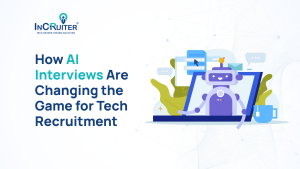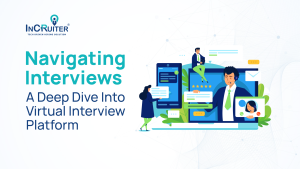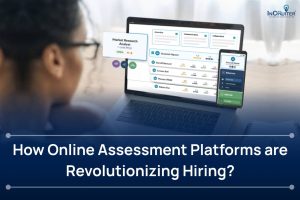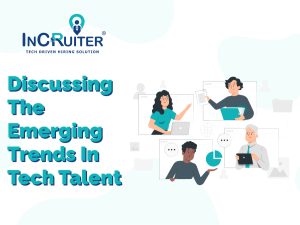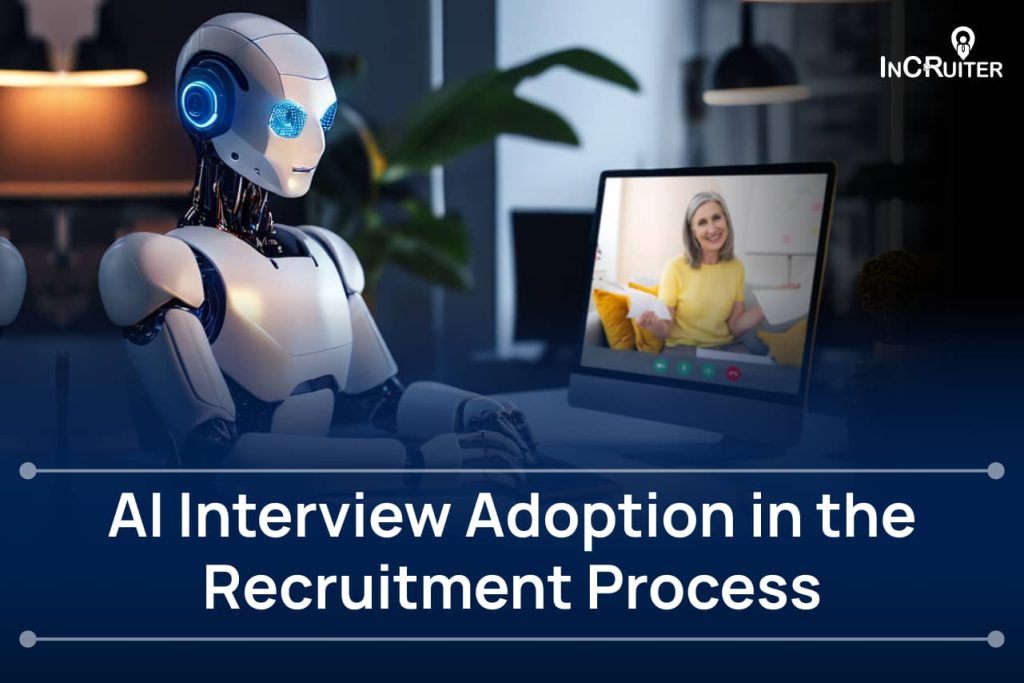
As companies across the globe face the challenge of managing growing candidate pools and improving hiring efficiency, AI interviews are quickly becoming a crucial solution. AI-driven tools, such as automated video interviews and conversational AI, are redefining the recruitment process by enabling organizations to evaluate candidates faster, more accurately, and with greater objectivity.
According to recent studies, nearly 70% of global companies are expected to integrate AI interview technology into their hiring processes by 2025. Industries like IT, BFSI, and healthcare are leading the charge, using AI interview tools to streamline technical assessments, reduce bias, and improve the overall candidate experience.
In this article, we explore how AI interviews are rapidly reshaping recruitment on a global scale, the reasons behind this adoption, and what the future holds for AI-powered hiring tools.
What is an AI Interview?
An AI interview is a new way for companies to conduct interviews during the hiring process. Instead of meeting a person, you answer questions on a video call in a virtual AI interview platform with a computer. The cool part? This platform uses machine learning algorithms and natural language processing (NLP) to understand not just your answers but also how you say them like your tone, facial expressions, and body language.
You’ll be asked some questions, and the AI interview looks at things like how confidently you speak and how you move. If it wants more details, it will ask follow-up questions just like a person would.
It helps companies get a full picture of your communication skills, technical knowledge, and how you handle problems, all in a relaxed, pressure-free way.
The History of AI Interviews
AI interviews were created to solve key problems in hiring, like the time it took to go through resumes and the risk of missing great candidates. Traditional hiring was slow, inconsistent, and often biased. With the advancement of technology, AI interviews brought faster, fairer, and more accurate hiring solutions.
Timeline of Key Milestones:
2010: AI interviews began when companies started using Applicant Tracking Systems (ATS). These tools started organizing resumes and scanning for relevant keywords, laying the groundwork for AI interviews role in the hiring process.
2014: By 2014, companies started using AI video interviews. During live virtual interviews, these tools analyzed responses, speech patterns, and facial expressions, offering suggestions behind the scenes to make interviews more productive.
2016: AI interviews got smarter, evaluating candidates’ behavior, communication style, and technical knowledge, providing deeper insights into a candidate’s fit.
2018: AI interview tools began running coding assessments in real-time. They could evaluate both soft and technical skills, giving a more complete view of candidates.
2020: The COVID-19 pandemic made one-way video interviews popular. AI interview tools helped recruiters send invites, and candidates could record responses at their convenience, streamlining the process.
2023: AI interviews became more interactive with follow-up questions through its conversational AI, making the process feel more natural. This improvement reduced hiring time by 50% and boosted hiring quality.
2024: Gamified AI interviews entered the scene. These tools introduced interactive, game-like scenarios, offering more profound insights into problem-solving and decision-making abilities.
Also Read: Hire Manpower Easily With The Help Of Recruitment Agencies
Market Trends in AI Interviews
AI-powered interviews are transforming recruitment by offering faster, more accurate, and fairer hiring solutions. Here are the latest statistics showing how AI interviews are benefiting companies and their future growth predictions.
Faster Hiring Process
According to a report by Hiring Success, AI-driven interviews can reduce time-to-hire by 50%, and it’s predicted to reduce hiring time by 80% by the end of 2025. This massive reduction in time gives recruiters more bandwidth to focus on high-priority tasks.
Improved Hiring Quality
A study by Harvard Business Review found that AI interviews improved the quality of hires by up to 30% by reducing human bias and providing data-driven insights. This figure is expected to grow to 60% by 2027 as AI interview solutions continue to evolve.
Cost Efficiency
According to IBM’s AI and Talent Acquisition report, companies can save up to 40% on recruitment costs by leveraging AI interview tools for automating screening and interviews. This cost-saving is expected to rise to 80% by 2026 as AI interview software becomes more integrated and efficient.
Enhanced Candidate Experience
A survey conducted by Talent Board revealed that 70% of candidates prefer video or AI-powered interviews for their flexibility and convenience. This figure is expected to increase to 95% due to the intuitive interface and ease of use of modern AI-powered interview platforms.
Predictive Insights
PwC’s Report on the adoption of AI interviews in recruitment discusses how AI interview tools offer predictive insights, assessing candidate behavior, communication style, and problem-solving abilities to predict future job performance. This predictive ability is expected to improve the accuracy of hiring decisions as AI continues to advance.
Scalability
LinkedIn’s 2023 Global Talent Trends Report highlights the 70% increase in the use of AI interviews to handle high-volume hiring while ensuring quality assessments. This figure is projected to reach 85% by the end of 2025 as more companies adopt AI to scale their recruitment processes.
Also Read: BFSI Hiring
Industry-Specific AI Interview Adoption
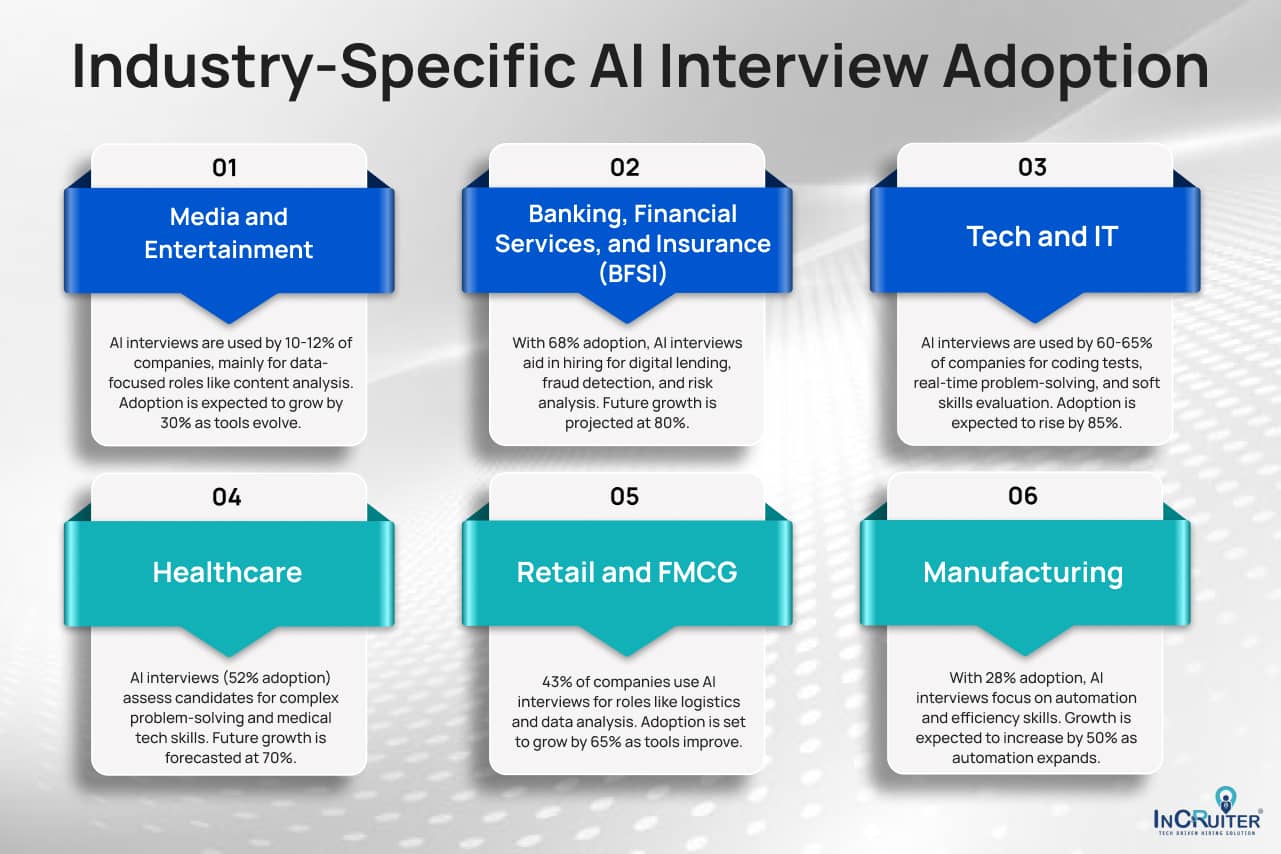
Media and Entertainment
The media and entertainment industry is slow to adopt AI interviews, with only 10-12% using them right now. This is mainly because creative jobs don’t always fit with standard assessments. However, AI interview tools are starting to help hire for more data-focused roles, like content analysis and understanding audience behavior. In the future, the use of AI interview tools in media and entertainment is expected to grow by 30%.
Banking, Financial Services, and Insurance (BFSI)
In the BFSI sector, AI interviews are leading the way, with 68% of companies using them. These tools are helping businesses find the right people for jobs in areas like digital lending, fraud detection, and underwriting. AI interview tools look at a person’s behavior to check how well they handle risk, which is important for jobs where attention to detail and following rules matter. More BFSI companies are using AI to see how well candidates can adapt to fast-changing technology. The use of AI interviews in BFSI is expected to grow by 80% in the future.
Tech and IT
The tech industry is also using AI interviews a lot, with 60-65% of companies adopting them. AI helps with coding tests, real-time problem-solving, and even looking at how candidates handle soft skills. AI interviews now even ask follow-up questions to make the conversation more interactive. For example, if a candidate explains how they solved a coding issue, the AI might ask, “How would this work in a real-world setting?” or “What problems could come up with this solution?” In the future, more tech companies will use AI interviews in hiring, with adoption expected to rise by 85%.
Healthcare
Healthcare has an adoption rate of 52% for AI interviews, primarily for hiring hospital staff, nurses, and professionals working with medical technology and healthcare app development. These AI-driven interviews help evaluate how candidates handle complex medical problems and how effectively they use advanced tools, including digital health platforms and healthcare apps. While the technology brings efficiency and deeper skill assessment, privacy and ethical concerns still require careful attention. As AI interview systems continue to evolve, the healthcare industry, including healthcare app development roles, is expected to see a 70% increase in the use of AI interview tools for hiring.
Retail and FMCG
The retail and FMCG industries are catching up, with 43% of companies using AI interview tools in the hiring process. They use AI interview solutions to find people for roles like data scientists, logistics experts, and customer behavior analysts. AI tools help these companies make better hiring decisions while keeping customer data safe. As AI interview tools improve, the use of AI in retail and FMCG hiring is expected to grow by 65%.
Manufacturing
The manufacturing industry is behind, with just 28% of companies using AI interview solutions for hiring. AI interview tools are mostly used to find candidates with the right skills in automation and efficiency. However, many manufacturing companies are still sticking to old methods. As automation grows in this sector, the use of AI interview technology in hiring is expected to increase by 50%.
Why are AI interviews becoming a Go-To solution?
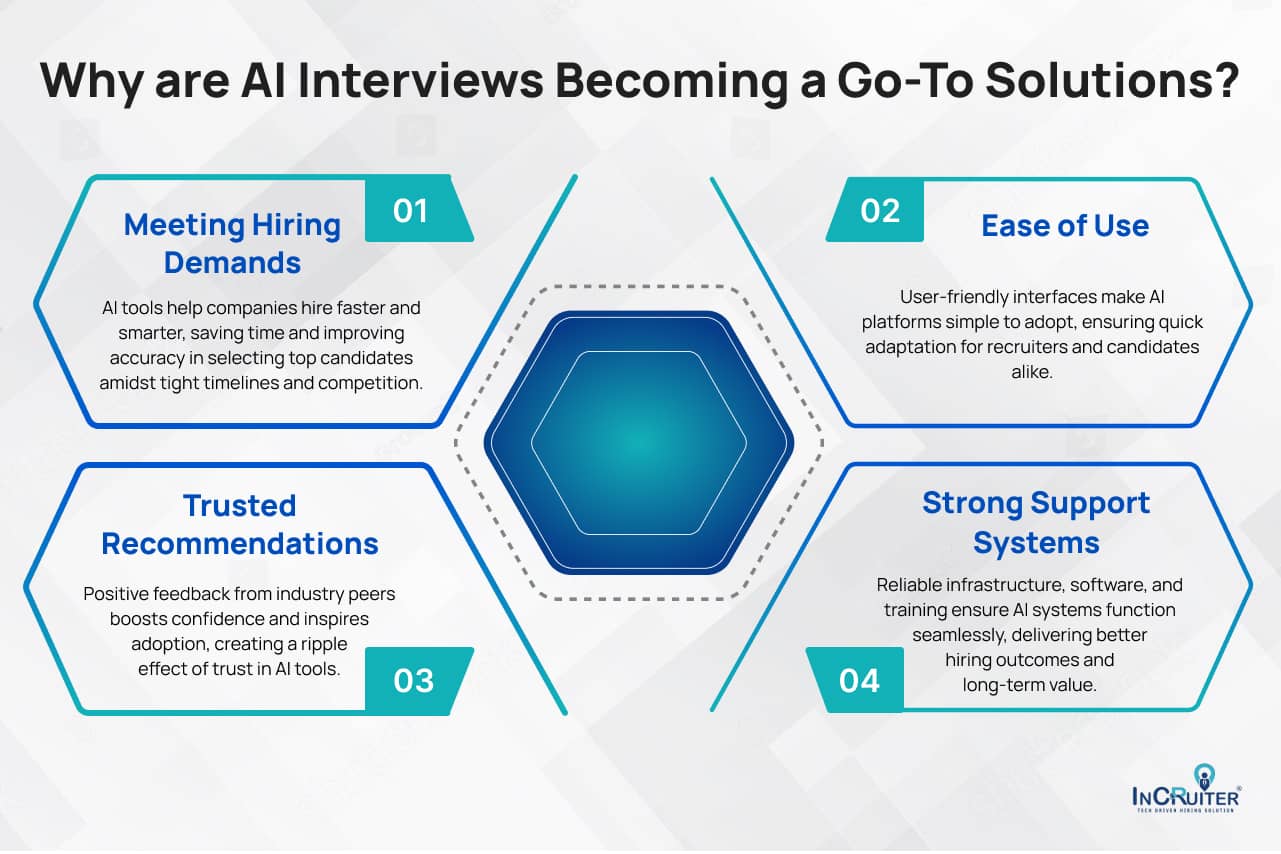
Interview with AI isn’t just a buzzword; it’s a practical change reshaping hiring. Let’s unpack the key reasons why more companies are turning to AI interviews for recruitment.
Meeting Rising Hiring Demands
Companies need to hire smarter and faster, and AI interview tools help achieve both. These tools not only save time but also improve accuracy in finding the right candidate. Instead of sifting through mismatched profiles, recruiters can focus on top contenders. With tight timelines and fierce competition for talent, AI ensures that every step counts.
Easy to Start and Simple to Use
Trying new technology can feel overwhelming, but AI-driven platforms make it simple. Their clean interfaces and user-friendly designs mean both recruiters and candidates can adapt quickly. The learning curve is minimal, making adoption less intimidating and more rewarding. When systems are straightforward, they naturally become a favorite.
Following Trusted Recommendations
Word-of-mouth remains powerful. When industry peers or respected professionals vouch for AI tools, it sparks interest and trust. Seeing others succeed with these systems encourages companies to try them too. It’s like a chain reaction; one success story inspires another, spreading confidence in the technology.
Reliable Support and Infrastructure
AI works best when supported by the right tools and resources. Reliable software, strong hardware, and proper training create a solid foundation. Without this setup, even advanced systems can stumble. Companies that invest in these essentials experience smoother processes and better hiring outcomes, making AI a long-term asset.
InCruiter AI Interview Solution: Marketing Leader Meeting Industry Needs
InCruiter’s AI interview platform is leading the way in transforming recruitment, driven by its innovative features that address the evolving needs of industries like IT, BFSI, and healthcare.
Key Features Fulfilling Industry Requirements:
- Automated Scheduling: InCruiter streamlines the scheduling process, allowing candidates and interviewers to pick time slots based on availability, which reduces delays and administrative overhead for recruiters.
- Automated Coding Assessment: Integrated technical assessments evaluate candidates’ coding skills in real time, ensuring precision in hiring for software development and IT roles.
- Conversational AI: With dynamic follow-up questions based on each response, the platform evaluates candidates more holistically, examining technical and behavioral competencies.
- Instant Feedback: InCruiter provides instant feedback to both candidates and recruiters, improving transparency and speeding up the decision-making process.
- Bias-Free Evaluation: By automating assessments, InCruiter removes unconscious bias from the hiring process, leading to fairer, more diverse recruitment outcomes.
- Enhanced Candidate Experience: With flexible scheduling, real-time updates, and a user-friendly interface, the platform offers a seamless and positive candidate experience.
Future Predictions
By 2030, AI interviews will become a core component of recruitment strategies in India, with over 70% of enterprises incorporating AI at some stage of their hiring process, as predicted by Deloitte. Advances in natural language processing and video analysis will make these tools more precise and adaptive, enhancing both speed and accuracy in evaluating candidates.
According to Statista, the AI hiring tools market is expected to grow at an 18.2% CAGR starting from 2025, indicating broad industry adoption, particularly in IT, BFSI, and healthcare sectors.
Furthermore, AI is projected to contribute up to $15.7 trillion to the global economy by 2030, surpassing the combined output of China and India. This immense growth will drive innovation and transform recruitment practices, solidifying AI’s role as a key player in the global economy and recruitment landscape.
Also read: Beyond the Resume: How AI Interview Bots Enhance Screening?
Conclusion
AI interviews are quickly becoming a huge part of recruitment, especially in fields like IT, banking, finance, and healthcare. They’re not just a temporary phase; they’re here to stay. InCruiter’s platform is at the heart of this shift, bringing in some amazing tools to make hiring simpler and quicker. Whether it’s scheduling interviews automatically, running real-time coding tests, or using smart AI to really understand a candidate’s abilities, this platform makes it all possible.
So, what makes it so special? Well, it saves tons of time, helps you find the best candidates faster, and reduces bias. This means companies can hire more people while still making sure they get the right fit.
Want to see how it works? Book a demo and find out how the InCruiter AI interview solution can completely change the way you hire!
Ready to Transform Your Hiring Process?
Discover how our AI-powered interview platform can streamline your recruitment and find the best candidates faster.

